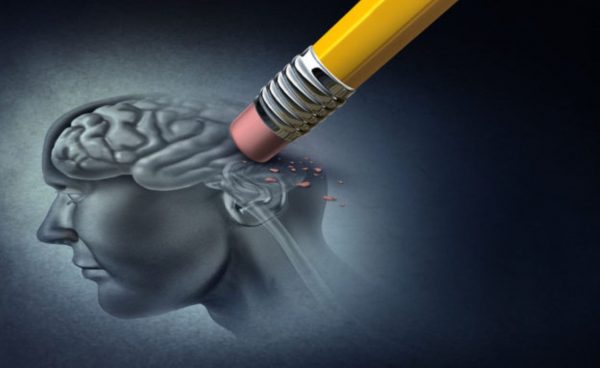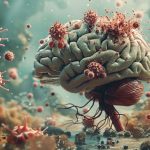We all like to think that there is a single, correctable cause of disease. But the fact is, when things go wrong in the body, it’s never just one thing. And often-times, some of the things that negatively affect your health don’t even seem to have anything to do with the health condition in question.
Cognitive decline, dementia and Alzheimer’s disease are perfect examples.
Sure, it makes sense that the less we use our brains, the greater the likelihood we will experience cognitive issues. Even the idea that low physical activity reduces brain function makes sense. It is very easy to imagine how sitting around reduces the flow of blood, oxygen and nutrients to your brain.
Food, too. It’s not hard to visualize how deficiencies in certain vitamins, minerals, antioxidants, and phytochemicals could affect brain activity.
But other things? Their effects on our brain health aren’t nearly as obvious, yet they exist.
How Your Senses Affect Your Cognitive Function
Losing the sense of smell may not sound that disturbing. But about 90% of what we “taste” actually comes from our ability to smell. So when you lose your sense of smell, you lose your sense of taste, too.
The big problem is that, over the years, we’ve learned that people who develop Alzheimer’s can lose their sense of smell and taste months – even years – before they start showing symptoms of memory loss. The more rapid the sensory loss, the greater the risk of cognitive decline.
In other words, a declining sense of smell is an early warning sign of declining cognitive function and Alzheimer’s disease.
As a matter of fact, you may have heard about the peanut butter test. It was big news about 10 years ago, when researchers discovered people in the early stages of Alzheimer’s disease have a hard time smelling peanut butter when it’s held a short distance from their left nostril.
Since then, we’ve discovered that peanut butter isn’t the only odor that’s hard for Alzheimer’s patients to detect. Other odors include coffee, lemon, lavender, peppermint and various other scents.
I frequently use Smell Identification Testing on my own patients. If they are unable to identify the odors, I know that I need to watch them down the road for the development of neurodegenerative diseases.
If you have difficulty detecting odors, make sure to mention it to your doctor so he or she can perform some follow-up testing.
And what about hearing loss? About one out of every three adults in the U.S. between 65 and 74 has hearing loss. And nearly half of those older the 75 have hearing difficulties.
Unfortunately, older adults with hearing loss are also more likely to develop dementia, and the risk of dementia rises incrementally with the severity of the hearing loss.
But there is good news! When people get and use hearing aids, the risk of dementia drops significantly.
In July of 2023, a study published in The Lancet pooled together several groups of hearing challenged older adults. All of the patients received either hearing aids or health education. At the end of the 3-year study, those who received hearing aids and had a higher risk of dementia had an almost 50% reduction in the rate of cognitive decline compared to the others.
Because hearing loss occurs so slowly, you may not even notice it is happening until your world is filled with silence. So be sure to get your hearing checked annually. The sooner you correct any deficits, the quicker you will adapt to your new hearing aid and slash your chances of mental decline.
Even vision impairment can affect mental faculties. They say the eyes are the windows to the soul, but maybe they are the windows to your brain health, too.
In an analysis of 110 studies on vision and cognition, John Hopkins researchers found that 91 of the studies (83%) reported a strong associated between vision and cognitive impairment.
However, you will be glad to hear that the simple act of getting your eyes checked regularly and wearing prescribed lenses can protect against cognitive decline. In the meantime, don’t forget to eat for your vision.
3 Bad Habits that Turn Your Brain to Mush
Watching too much TV. Back in the 70’s we often referred to the TV as “the boob tube.” And maybe we weren’t that far off base.
A recent study compared different types of screentime with the development of dementia, Parkinson’s and depression. It found that extended periods of TV watching was associated with a higher risk of these threats, and negatively affected hippocampal volume.
On the other hand, using a computer for an hour or less daily was associated with a reduced risk of these three conditions compared with watching television or longer sessions at the computer.
Still, the authors found that replacing screentime with physical activity was even better at warding off dementia, Parkinson’s and depression.
Drinking too much diet soda. I frequently warn against drinking diet sodas and eating artificially sweetened foods. Despite popular belief, they actually promote weight gain and diabetes… the two things they are supposed to protect against.
Just as importantly, drinking as little as one diet soda a day nearly triples your chances of Alzheimer’s disease or suffering from a stroke that could impair your brain activity.
Neglecting your oral health. You probably already know that plaque and bacteria lodge themselves in periodontal pockets. What you might not have heard is that the more deeply those pockets develop, and the more bacteria that accumulates within them, the greater your chances of Alzheimer’s or dementia.
So remember to keep up on your annual or semi-annual dental visits. And don’t forget to brush, floss and rinse at least twice a day – every single day!
SOURCES:
Tian Q, Bilgel M, Moghekar AR, Ferrucci L, Resnick SM. Olfaction, Cognitive Impairment, and PET Biomarkers in Community-Dwelling Older Adults. J Alzheimers Dis. 2022;86(3):1275-1285.
Pacyna RR, Han SD, Wroblewski KE, McClintock MK, Pinto JM. Rapid olfactory decline during aging predicts dementia and GMV loss in AD brain regions. Alzheimers Dement. 2023 Apr;19(4):1479-1490.
Age-Related Hearing Loss (Presbycusis). National Institute on Deafness and Other Communication Disorders. Last Updated Mar 2023.
Huang AR, Jiang K, Lin FR, Deal JA, Reed NS. Hearing Loss and Dementia Prevalence in Older Adults in the US. JAMA. 2023 Jan 10;329(2):171-173.
Lin FR, Pike JR, Albert MS, Arnold M, Burgard S, Chisolm T, Couper D, Deal JA, Goman AM, Glynn NW, Gmelin T, Gravens-Mueller L, et al. Hearing intervention versus health education control to reduce cognitive decline in older adults with hearing loss in the USA (ACHIEVE): a multicentre, randomised controlled trial. Lancet. 2023 Sep 2;402(10404):786-797.
Nagarajan N, Assi L, Varadaraj V, Motaghi M, Sun Y, Couser E, Ehrlich JR, Whitson H, Swenor BK. Vision impairment and cognitive decline among older adults: a systematic review. BMJ Open. 2022 Jan 6;12(1):e047929.
Spierer O, Fischer N, Barak A, Belkin M. Correlation Between Vision and Cognitive Function in the Elderly: A Cross-Sectional Study. Medicine (Baltimore). 2016 Jan;95(3):e2423.
Wu H, Gu Y, Du W, Meng G, Wu H, Zhang S, Wang X, Zhang J, Wang Y, Huang T, Niu K. Different types of screen time, physical activity, and incident dementia, Parkinson’s disease, depression and multimorbidity status. Int J Behav Nutr Phys Act. 2023 Nov 3;20(1):130.
Pase MP, Himali JJ, Beiser AS, Aparicio HJ, Satizabal CL, Vasan RS, Seshadri S, Jacques PF. Sugar- and Artificially Sweetened Beverages and the Risks of Incident Stroke and Dementia: A Prospective Cohort Study. Stroke. 2017 May;48(5):1139-1146.
Beydoun MA, Beydoun HA, Hossain S, El-Hajj ZW, Weiss J, Zonderman AB. Clinical and Bacterial Markers of Periodontitis and Their Association with Incident All-Cause and Alzheimer’s Disease Dementia in a Large National Survey. J Alzheimers Dis. 2020;75(1):157-172.






